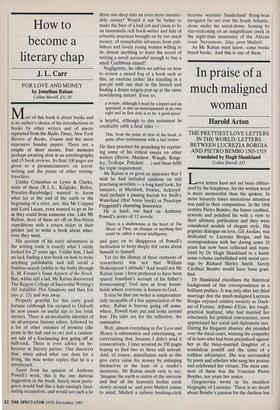How to become a literary chap
J. L. Carr
FOR LOVE AND MONEY by Jonathan Raban
Collins Harvill, £11.50
Most of this book is about books and is its author's choice of his introductions to books by other writers and of pieces reprinted from the Radio Times, New York Review of Books, Granta and the more expensive Sunday papers. There are a couple of short stories, four memoirs perhaps awaiting slots in an autobiography and 15 book reviews. Its final 100 pages are given to a pronunciamento on travel- writing and the praise of other writing- travellers.
Unlike Columbus or Lewis & Clarke, none of these (R.L.S., Kinglake, Belloc, Priestley-Bainbridge) wanted to know what lay at the end of the earth or the beginning of a river, nor, like Mr Crippen and Lord Lucan, even wanted to go as far as they could from someone else. Like Mr Raban, most of them set off on flea-bitten expeditions with a return ticket in their pocket just to write a book about wher- ever they went.
His account of his early adventures in the writing trade is exactly what I vainly looked for 25 years ago. Unlike him, I had no luck finding a text-book on how to write anything publishable and still recall a fruitless search (whilst in the bath) through E. M. Forster's Some Aspects of the Novel. But, whilst still a lad, Mr Raban discovered The Regent College of Successful Writing's 101 Infallible Plot Situations and then Iris (see p. 15) and was away.
Properly grateful for this early good fortune (although Iris escaped to Oxford) he now passes on useful tips to less brisk starters. There is an invaluable identikit of an all-purpose literary editor, followed by a list of other enemies of promise (the pram in the hall and so on) and a caution- ary tale of a freelancing don going off at half-cock. There is even advice on be- haviour at literary parties. One discovers that, when asked what one does for a living, the wise writer replies that he is a steeplejack.
Apart from his opinion of Anthony Powell's work, this is the one dubious suggestion in the book. Surely most party- goers would find this a hair-raisingly fasci- nating occupation, and would not such a lie drive one deep into an even more inextric- able corner? Would it not be better to make the best of a bad job and claim to be an immensely rich book-writer and hint of sybaritic practices brought on by too much money, of remarkable advances from pub- lishers and lovely young women willing to do almost anything to learn the secret of writing a novel successful enough to buy a small Caribbean island?
Negligently, he offers no advice on how to review a mixed bag of a book such as this, an exercise rather like standing in a gun-pit with one shot in the breech and finding a dozen targets pop up at the same bewildering instant. Even so, a review, although it must be a report and an appraisal, is also an entertainment in its own right and its first duty is to be 'a good piece'
is helpful, although to this testament he creditably adds a fatal rider -
This, from the point of view of the book, is quite often synonymous with a bad review.
He then practises his preaching by reprint- ing some of his critical essays on other writers (Byron, Mayhew, Waugh, Kings- ley, Trollope, Pritchett. . .) and these fulfil his triple requirement.
Mr Raban is so good an appraiser that I wish he had included opinions on still practising novelists — a long hard look, for instance, at Murdoch, Fowles, Ackroyd. And perhaps a passing hurrah for Swift's Waterland (that brave book) or Penelope Fitzgerald's charming Innocence.
He is hard, too hard on Anthony Powell's series of 12 novels: There is a shallowness at the heart of The Music of Time, an absence of anything that could be called a moral intelligence.
and goes on to disapprove of Powell's inclination to keep deeply felt views about himself to himself.
Yet (to the dismay of three centuries of researchers) was not that William Shakespeare's attitude? And would not Mr Raban (senr.) have preferred to have been spared Jonathan's account of his father's homecoming? God save us from house- holds where everyone is honest-to-God.
It may be that one writer is temperamen- tally incapable of a fair appreciation of the other. Raban is forever going off some- where, Powell stays put and looks around him. His tales are for the reflective, the ruminative.
Well, almost everything in For Love and Money is informative and entertaining, so entertaining that, because I didn't read it consecutively, I later scoured its 350 pages hoping to find two or three still unread. And, of course, miscellanies such as this give extra value for money by enlarging themselves in the haze of a reader's memories. Mr Raban needs only to say, 'Imagine the earth is centre of the universe and that all the heavenly bodies circle slowly around us' and poor Mullett comes to mind, Mullett a railway booking-clerk
become wartime Sunderland flying-boat navigator far out over the South Atlantic, alone under his astral-dome, homing by star-reckoning on an insignificant creek in the night-time immensity of the African coast. Nevermore. Alas, poor Mullett!
As Mr Raban must know, some books breed books. And this is one of them.










































































































 Previous page
Previous page